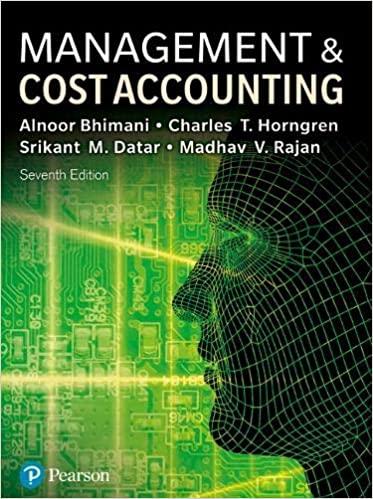British Beverages bottles two soft drinks under licence to Cadbury Schweppes at its Manchester plant. Bottling at
Question:
British Beverages bottles two soft drinks under licence to Cadbury Schweppes at its Manchester plant. Bottling at this plant is a highly repetitive, automated process. Empty bottles are removed from their carton, placed on a conveyor, and cleaned, rinsed, dried, filled, capped and heated (to reduce condensation). The only stock held is either direct materials or else finished goods. There is no work in progress.
The two soft drinks bottled by British Beverages are lemonade and diet lemonade. The syrup for both soft drinks is purchased from Cadbury Schweppes. Syrup for the regular brand contains a higher sugar content than the syrup for the diet brand.
British Beverages uses a lot size of 1000 cases as the unit of analysis in its budgeting. (Each case contains 24 bottles.) Direct materials are expressed in terms of lots, where one lot of direct materials is the input necessary to yield one lot (1000 cases) of beverage. In 2018, the following purchase prices are forecast for direct materials:

The two soft drinks are bottled using the same equipment. The equipment is cleaned daily, but it is only rinsed when a switch is made during the day between diet lemonade and lemonade. Diet lemonade is always bottled first each day to reduce the risk of sugar contamination. The only difference in the bottling process for the two soft drinks is the syrup.
Summary data used in developing budgets for 2018 are as follows:
a. Sales:
● Lemonade, 1080 lots at £9000 selling price per lot.
● Diet lemonade, 540 lots at £8500 selling price per lot.
b. Opening (1 January 2018) stock of direct materials:
● Syrup for lemonade, 80 lots at £1100 purchase price per lot.
● Syrup for diet lemonade, 70 lots at £1000 purchase price per lot.
● Containers, 200 lots at £950 purchase price per lot.
● Packaging, 400 lots at £900 purchase price per lot.
c. Opening (1 January 2018) stock of finished goods:
● Lemonade, 100 lots at £5300 per lot.
● Diet lemonade, 50 lots at £5200 per lot.
d. Target closing (31 December 2018) stock of direct materials:
● Syrup for lemonade, 30 lots.
● Syrup for diet lemonade, 20 lots.
● Containers, 100 lots.
● Packaging, 200 lots. e Target closing (31 December 2018) stock of finished goods:
● Lemonade, 20 lots.
● Diet lemonade, 10 lots.
f. Each lot requires 20 direct manufacturing labour-hours at the 2018 budgeted rate of £25 per hour. Indirect manufacturing labour costs are included in the manufacturing overhead forecast.
g. Variable manufacturing overhead is forecast to be £600 per hour of bottling time; bottling time is the time the filling equipment is in operation. It takes two hours to bottle one lot of lemonade and two hours to bottle one lot of diet lemonade. Fixed manufacturing overhead is forecast to be £1 200,000 for 2018.
h. Hours of budgeted bottling time is the sole allocation base for all fixed manufacturing overhead.
i. Administration costs are forecast to be 10% of the cost of goods manufactured for 2018. Marketing costs are forecast to be 12% of sales for 2018. Distribution costs are forecast to be 8% of sales for 2018.
Required
Assume British Beverages uses the first-in, first-out (FIFO) method for costing all stock. On the basis of the preceding data, prepare the following budgets for 2018:
1. Revenue budget (in £)
2. Production budget (in units)
3. Direct materials usage budget (in units and £)
4. Direct materials purchases budget (in units and £)
5. Direct manufacturing labour budget
6. Manufacturing overhead costs budget
7. Closing finished goods stock budget
8. Cost of goods sold budget
9. Marketing costs budget
10. Distribution costs budget
11. Administration costs budget
12. Budgeted profit and loss account.
Step by Step Answer:

Management And Cost Accounting
ISBN: 9781292232669
7th Edition
Authors: Alnoor Bhimani, Srikant M. Datar, Charles T. Horngren, Madhav V. Rajan





